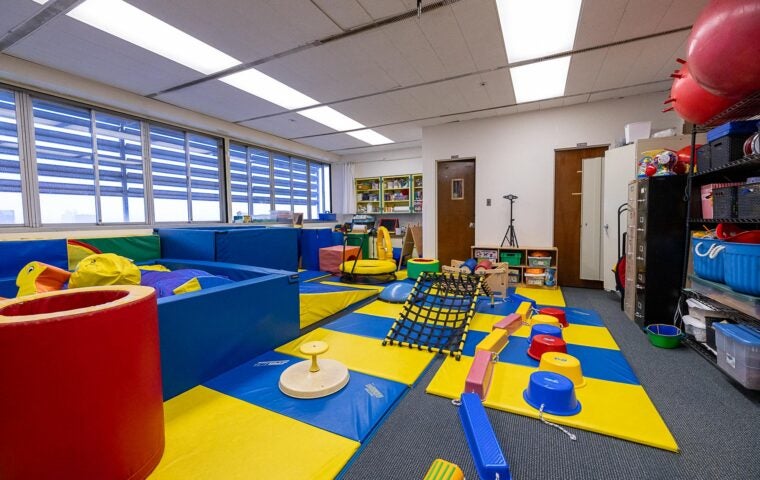Research Program

Leadership
Alissa Ellis, Ph.D.
Program Director
Contact Info
Please email us for additional information and exact session start dates.
About
The thinkSMARTⓇ program was born out of Dr. Ellis’ frustration with the lack of effective, non-medication interventions for youth with executive dysfunction, particularly (but not limited to) individuals with ADHD. Pervasive and debilitating weaknesses in areas of organization, time management, task initiation/completion, and planning can hinder success for individuals with mood, anxiety and attention problems. The thinkSMARTⓇ program specifically targets these areas by teaching use of concrete behavioral strategies to compensate for these weaknesses.
The skills taught in thinkSMARTⓇ are intended to become habits through daily reinforcement. Parent support is essential for skill building and habit development both in group and at home. thinkSMARTⓇ helps parents with the language to effectively communicate and prompt use of the skills with their teen. Parents play a critical role in the success of skill acquisition. We ask that one parent attend each of the groups with their child to ensure that the strategies taught in thinkSMARTⓇ are used regularly at home.
Program Information
Enrollment
Currently the thinkSMARTⓇ program is enrolling for youth and young students ages 12-17. Participants must be at least 12 years old and in middle school or high school.
thinkSMARTⓇ enrolls new groups three times each year; once in August at the beginning of school, once in November, and once in March. We hope that the skills taught as a part of the program become habits and therefore want each child to have the opportunity to build the skills that they are learning while in school.
Program participants will complete 12, 90 minute weekly group classes over 3 months. For our groups with youth under the age of 18, parents must be able to attend weekly for the 12 classes and support youth through the week with the use of the skills. Parents must commit to completing the program. Participants must be willing to participate in class exercises and commit to practicing the skills at home with their parent.
Although we are currently only enrolling a group for students 12-17, we are open to starting group for young adults and adults if we have enough interest. So, please contact us at thinkSMART@ucla.edu!
Our Mission and Vision
The thinkSMARTⓇ program was born out of Dr. Ellis’ frustration with the lack of effective, non-medication interventions for youth with executive dysfunction, particularly (but not limited to) individuals with ADHD. Pervasive and debilitating weaknesses in areas of organization, time management, task initiation/completion, and planning can hinder success for individuals with mood, anxiety and attention problems. The thinkSMARTⓇ program specifically targets these areas by teaching use of concrete behavioral strategies to compensate for these weaknesses.
The skills taught in thinkSMARTⓇ are intended to become habits through daily reinforcement. Parent support is essential for skill building and habit development both in group and at home. thinkSMARTⓇ helps parents with the language to effectively communicate and prompt use of the skills with their teen. Parents play a critical role in the success of skill acquisition. We ask that one parent attend each of the groups with their child to ensure that the strategies taught in thinkSMARTⓇ are used regularly at home.
Is My Child A Good Candidate?
Executive functions seem straightforward when defined, but understanding how weaknesses in EF translate into daily behaviors can be less clear. Often, parents realize that they’re often frustrated with their teen for their approach to tasks and responsibilities, but aren’t sure why there are problems. Weaknesses in day-to-day executive functioning skills may underlie many of these frustrations. The items below present just a few examples of weaknesses in areas of executive function. Note that even though the examples below are categorized by an area of executive function, the majority of tasks utilize multiple EF skills simultaneously! As you can imagine, this list is not exhaustive, but highlights some of the weaknesses targeted in thinkSMART®.
Planning:
- My child does not bring required materials home from school (e.g., books, papers) and/or forgets items needed for activities (e.g., sports equipment, packing items).
- My child does not/cannot use a planner or calendar
Organization:
- My child’s room/desk/backpack is typically a mess…and he/she cannot find needed items.
- Despite finishing homework, my child often forgets to turn in completed homework on time.
Task Completion:
- My child often has trouble staying focused and finishing an assignment.
- My child is often excited to begin different projects, but lacks the endurance and interest to complete them.
Task initiation:
- For many assignments, my child typically fails to plan ahead and waits until they become urgent and stressful.
- My child requires multiple prompts to start homework, chores, and other non-preferred activities.
Time Management and Estimation:
- In managing the competing demands in his/her life, my child does not prioritize well.
- When given assignments, projects, etc. my child cannot accurately estimate the amount of time needed to complete that assignment.
Self-monitoring and self-awareness:
- My child often doesn’t know when he/she is off track and fails to ask for help.
- My child is often distracted and cannot bring him/herself back to task.
Emotional Control:
Particularly under stress, my child gets angry and oppositional.
My child can become easily overwhelmed and over-reacts to small problems.
thinkSMART® Sessions
What do we target in thinkSMART®?
- Planner use
- Time awareness
- Scheduling
- To-do lists
- Time management
- Breaking things down
- Task initiation
- Increasing motivation & rewards
- Organization
- Long-term planning
- Emotional control
In every session we include:
- Mindfulness
- Didactic instruction on skill
- In-session practice of skill
- Discussion of obstacles
- Problem solving
- At-home skill building activity
- Weekly reminders
Some of the key ingredients to improvement!
- Parent involvement/engagement
“I feel like our relationship is better because we are going through this together! We talk about using the skills.” –Mom of 15 year old boy
- Improved communication
“The other day, my mom identified that I was on a thought train [mindfulness skill], which helped me recognize this.” –14 year old boy
- Social comparison
“Fine, I’ll write in my planner but only because you’re bringing us cookies if we all do it.”—13 year old girl
- Validation of struggles
“wait, you forgot your backpack this week, too?”—13 year old boy
- Effective Communication
Executive Function
Executive Function
Strong executive functioning (EF) has been related to success in school, jobs, and relationships, as well as to improved mental and physical health and overall quality of life. Weak EFs in childhood predict weak EFs in adulthood. As such, if the foundation for these skills is not solidly constructed in childhood, they are not likely to improve into adulthood. Executive functioning in adolescence has been related to self-reliance, strong identity development, and work orientation (Galambos et al. 2005). This suggests that youth with solid EF skills can approach their lives in a strategic, flexible, and efficient manner and be more likely to develop a stronger, more independent sense of self.
The “Is my child a good candidate?” and the “Development” tabs contain more information about executive functions, their development, how they manifest in behavior. The thinkSMARTⓇ program aims to target executive functions using behaviorally-based skills training in a group setting. Read the tabs of this section for more information about EF!
Development
At ages 3-5…
- inhibition, working memory, cognitive flexibility, goal directed behaviors and planning
At ages 4-5…
- Day-to-day EF skills emerge with metacognition, greater flexibility, and inhibitory self-control
- Preschool age kids reliably show: inhibition, shifting, emotional control, working memory, and plan/organize
At ages 6 and up,
- task initiation, organization of materials, self-monitoring
What might impede development of executive functions?
Unfortunately, we also know that poor executive functioning is a common correlate of many mental health problems. However, everyone can be impacted, some more than others. Below are a list of disorders or problems that are associated with weak or impaired executive functioning.
- Attention Deficit Hyperactivity Disorder (ADHD)
- Conduct Disorder
- Depression
- Obsessive Compulsive Disorder
- Schizophrenia
- Anxiety
- Autism
- Learning Disorders
- Traumatic Brain Injury
Our Team
-

Alissa Ellis, Ph.D.
Neuropsychologist -

Michelle Rozenman, Ph.D. (Collaborator)
Assistant Professor, University of Denver -

Alex Sturm, Ph.D. (Collaborator)
Assistant Professor, Loyola Marymount University
Research and Testimonials
The thinkSMART® program was developed using evidence-based practices for improving executive functioning through behavioral strategies. The program also incorporates aspects of cognitive-behavioral therapy (CBT) and mindfulness-based exercises, both shown to be effective in youth and adults with ADHD and other disorders (e.g., mood, anxiety). Although the thinkSMART® team is currently in the process of building a research program and publishing our findings, some of the articles under the “Research” tab highlight the importance and effectiveness of other skill-based intervention programs aimed at improving areas of executive function. While the current literature has focused on examining the effectiveness of interventions in individuals with ADHD, we aim to demonstrate that these skills can be taught to all teens with EF weaknesses.
Overall, the research suggests that skill-based, executive function interventions help to improve organization, time management, planning, homework management, symptoms of inattention, and overall academic functioning. Combined with the substantial literature on CBT and mindfulness-based practices which have been shown to improve mood, emotion regulation, attention, self-esteem, and self-monitoring skills, the thinkSMART® program is deeply rooted in empirically supported techniques.
In the future, we hope to share some thoughts from past participants about the program. We are open to feedback and are committed to sharing this information with you all when we can.
Research
Skills-based Interventions for Executive Functioning:
Development of a new psychosocial treatment for adult ADHD
- http://jad.sagepub.com/content/early/2007/08/21/1087054707305100.short
- Tested effectiveness of meta-cognitive therapy which involved skills to improve day-to-day functioning for adults with ADHD
- Used a group treatment approach
- Adults with ADHD showed improved attention, executive functioning skills
Organizational-skills interventions in the treatment of ADHD
- http://www.tandfonline.com/doi/abs/10.1586/14737175.8.10.1549
- Interventions associated with improvements in organization of materials, homework management, time management, and planning
- Organizational improvements showed reductions in ADHD symptoms
- Gains in academic functioning
Empirical Support for additional thinkSMART®components:
Cognitive Behavioral Therapy for ADHD:
Evaluation of Group Cognitive Behavioral Therapy for Adults With ADHD
- http://jad.sagepub.com/content/early/2008/02/29/1087054708314596.short
- CBT group had significantly greater improvement on knowledge of ADHD, self-efficacy, and self-esteem
- Sharing personal experiences with other adults with ADHD important aspect to invention
Effects of a school-based cognitive-behavioral intervention for ADHD children
- http://link.springer.com/article/10.1007/BF00925822
- CBT improved observed off-task and disruptive behavior
Cognitive-behavioral therapy for ADHD in medication-treated adults with continued symptoms
- http://www.sciencedirect.com/science/article/pii/S0005796704001366
- Stable on pharmacology randomized to CBT plus pharmacology or pharmacology alone
- CBT resulted in lower ADHD symptoms, lower anxiety, depression, and increased treatment response
Mindfulness-Based Approaches for ADHD:
Mindfulness Meditation Training in Adults and Adolescents With ADHD
- http://jad.sagepub.com/content/11/6/737.short
- ADHD in adults and adolescents
- Report high satisfaction in the study
- Improve behavioral and neurocognitive impairments such as anxiety and depression
Evaluation of a Mindfulness-based Intervention for Adolescents with Learning Disabilities and Co-occurring ADHD and Anxiety
- http://link.springer.com/article/10.1007/s12671-012-0089-2
- 20-week mindfulness training program
- Improved externalizing behavior, oppositional defiant problems, and conduct problems
- Boys improved in social problems and self-monitoring skills
- Boys with increased anxiety reported lower anxiety
Mindfulness Training for Parents and Their Children With ADHD Increases the Children’s Compliance
- http://link.springer.com/article/10.1007/s10826-009-9272-z
- Providing mindfulness training without a focus on reducing problem behaviors can enhance positive interactions
- Increased satisfaction of parenting
- Increased compliance when parent and child given mindfulness training
- Mothers reported increased happiness
- Training procedures provide personal transformations
Testimonials
Both parents and teens benefit from group skills!
“Good for teens (and parents) who aren’t sure how to get organized and manage their time.”
“Huge help to your child with weaknesses that become strengths. It was as much a help for me as it was for my child.”
What parents say:
“Great skills for any person no matter who you are — who doesn’t want to think smarter and work smarter.”
“thinkSmart is a life skills class that carries your child from teen through adulthood.”
“Gets kids ready to think more independently and ready for college.”
“Excellent course. Outstanding teachers. Great group interaction and story sharing to find out that the challenges that I have with my child are far from unique to him/my family. Wish we could have participated and benefited from this course several years ago. Love this course, much appreciation. Lots of benefits and fun!”
What teens say:
“Super supportive & extremely helpful for a massive variety of tasks.”
“This program allowed me to address work, stress, and time management that I didn’t think I’d ever be able to accomplish without the skills learned in this class.”
What participants say we address:
“They show you how to better manage your time using your real homework.”
“Learn skills to assist teenagers with scheduling their time and planning.”
“A way to become more organized and help you in school.”
“This program teaches insightful skills on time management, organization, scheduling, and emotional control.”
“Life skills or success & effective communication.”
FAQs
How are parents involved in the program?
Parents are included in thinkSMART® so that they can learn the skills alongside their child; subsequently, parents will be better able to support their child as they practice the skill throughout the week, as well as model skill use for them. At least one parent is expected to attend every session with their child.
Why is thinkSMART® conducted in a group setting?
thinkSMART® is conducted in a small group setting because many youth struggle with the same areas of executive function, such as long term planning, scheduling, motivation, etc. We use the group setting to aid problem solving and share experiences. Families will be exposed to novel problem solving skills that they can continue to use after the program. We also know that research supports group settings because groups allow for positive modeling of skill use, social reinforcement, and provide added support. Despite the program being offered in a group, participants receive individual feedback and help in their individualized areas of weakness, further contributing to improved executive functioning. We do not assume that this is a “one-size fits all” intervention and work hard to help families with their individual needs within the context of the program.
How much of the course is specific to diagnosis?
The program is not specific for a certain diagnosis, but is for anyone who has difficulties with executive functioning. We occasionally mention ADHD, anxiety, or depression because these things all affect executive functioning. There is a wide variety of developmental differences in each group, including those with no diagnoses at all. Please don’t worry about any diagnosis or label being put on your child. The only “label” might be that they could benefit from help with her executive functioning, because we ALL have weaknesses.
What can we expect from a session?
Each session will cover skills and concrete strategies to help improve different areas of executive function, such as time management, planning, and task initiation. Mindfulness exercises are taught at the beginning of every session as mindfulness is one the most direct ways to increase executive function. We will also review skills learned in the previous session and discuss what teens and parents found to be easy or challenging about practicing the skills, allowing for a chance to problem solve when teens feel like they are stuck. During session, we will cover new skills and have both teens and parents come up with concrete ways in which they can be practiced throughout the week. Skills are illustrated and practiced in session through interactive activities.
How motivated does the child need to be to participate?
All of the teens are typically very high functioning (i.e., able to tolerate a normal classroom setting, behaviorally appropriate, and engaged). Typically, they are bright and capable, but are struggling to get assignments in, write assignments down, get started on tasks, are losing materials, etc. The teens just needs to be motivated to attend every session and do weekly skills practice that work to improve executive functioning.
Is the cost of the program covered by insurance? Is there financial aid?
The cost of the program is not reimbursable through insurance, and we do not offer financial aid at this time. We are considered an educational intervention, rather than a medical service. We do not use CPT billing codes (requiring a diagnosis) which are required for insurance reimbursement. As such, the entire amount is “out of pocket. We have had participants tell us that the program is considered “tax deductible” with a referral indicating that it was recommended, but we’d encourage you to ask your tax professional about what this might mean.
Is the program cost due all at once?
The program fee is due before the first session of the program at the time of registration. We also offer a payment plan that involves 2 installments which are due before the 1st session and before the 7th session.
What happens if I miss a session? Can I pay “per session” rather than the full amount?
We do not offer fee reductions because thinkSMART® is offered as a full program, rather than “by sessions.” We understand that situations that cause families to miss a session may come up, and we are happy to accommodate these situations so that the course can make the most impact for both teens and parents. Typically, we do not offer make-up sessions, but we are always happy to meet with families either before or after the session missed to debrief them on the skills learned and give them any handouts from that session. In the past, parents have attended sessions when their teen is unable to and have shared skills at home. We also send weekly reminder emails and review skills throughout the program since each session builds on the previous.
Do you offer thinkSMART® sessions over the summer?
At this time, we do not offer thinkSMART® during the summer; many of the skills that we teach are best learned when applied to school assignments, projects, papers, etc. These are habits that can only be reinforced with daily use, so doing the program primarily during the school months is the ideal setting to enhance skill acquisition.